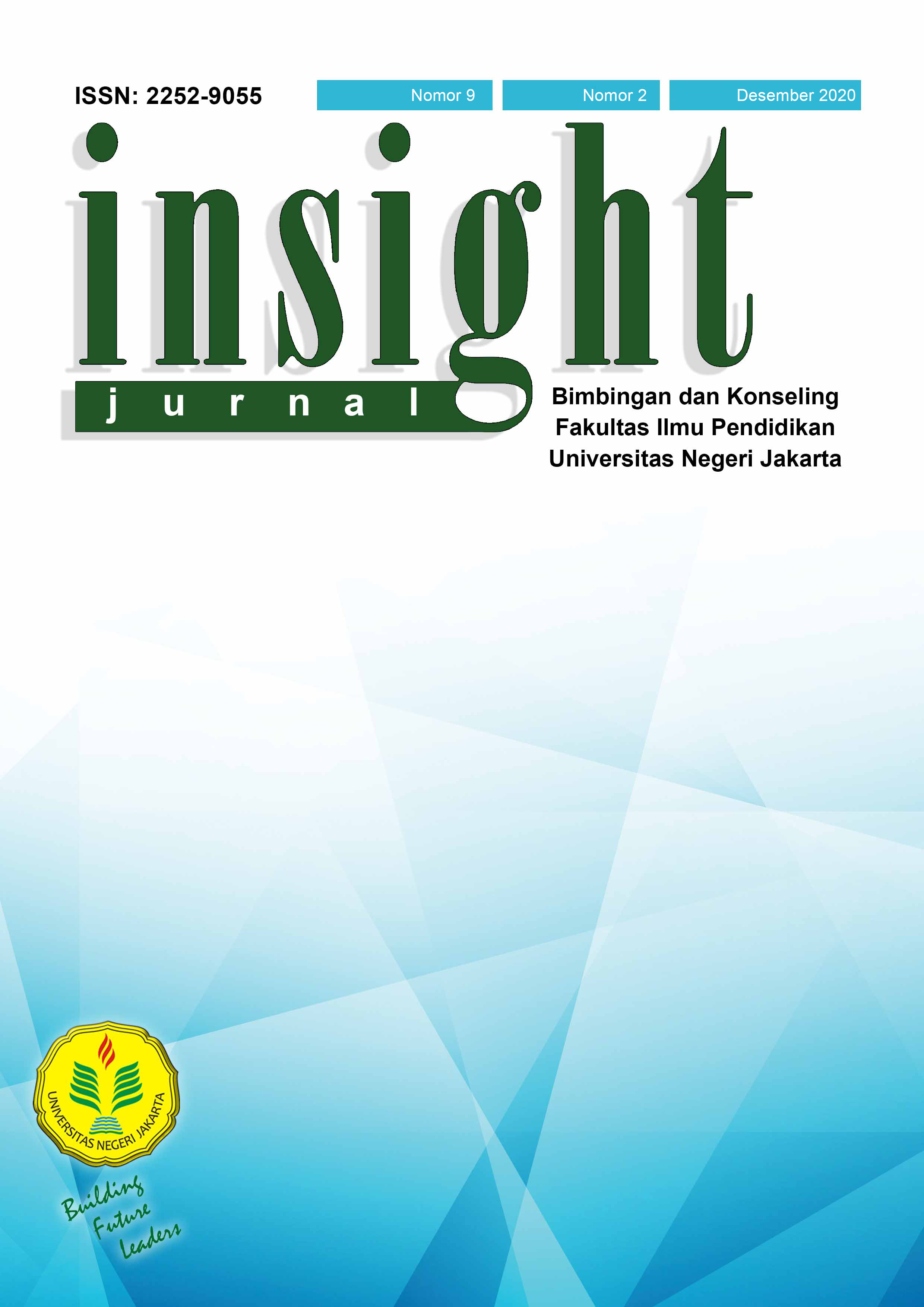Pengembangan Self-help Book Dengan Program Making Friends With Yourself untuk Meningkatkan Self-compassion Peserta Didik Kelas X SMA Negeri 38 Jakarta
Abstrak
Penelitian ini dilakukan untuk mengembangkan self-help book dengan program making friends with yourself untuk meningkatkan self-compassion peserta didik kelas X SMA Negeri 38 Jakarta. Metode penelitian yang digunakan dalam penelitian ini adalah DBR yang merupakan akronim dari Design Based Research atau biasa disebut Educational Design Research yang terdiri dari tiga tahapan inti yakni (1) Analisis dan Eksplorasi, (2) Desain dan Konstruk, (3) Evaluasi dan Refleksi. Penelitian ini hanya dilakukan sampai tahap evaluasi. Penelitian dilakukan di SMA Negeri 38 Jakarta. Subjek penelitian ini adalah 154 peserta didik kelas X SMA Negeri 38 Jakarta. Dalam mengumpulkan data, peneliti menggunakan teknik penyebaran angket dan wawancara pada peserta didik. Hasil uji validasi dengan ahli media, skor yang didapatkan sebesar 77,27% (layak) dengan keunggulan memiliki desain yang menarik, pemilihan ukuran dan bentuk yang tepat, serta tujuan materi dapat tersampaikan. Sedangkan hasil uji validasi dengan ahli materi mendapatkan skor sebesar 91,25% (sangat layak) yang artinya self-help book yang dikembangkan telah sesuai dengan program making friends with yourself. Pengembangan self-help book memberikan informasi mengenai self-compassion, serta keterampilan dalam mengembangkan self-compassion.
Kata Kunci: Self-Help Book, Self-Compassion.
Referensi
Bergsma, A. (2008). Do self-help books help? Journal of Happiness Studies, 9(3), 341–360. https://doi.org/10.1007/s10902-006-9041-2
Bluth, K., Gaylord, S. A., Campo, R. A., Mullarkey, M. C., & Hobbs, L. (2015). Making friends with yourself: a mixed methods pilot study of a mindful self-compassion program for adolescents. Mindfulness, 7(2), 479–492. https://doi.org/10.1007/s12671-015-0476-6
Campbell, L. F., & Smith, T. P. (2003). Integrating self-help books into psychotherapy. Journal of Clinical Psychology, 59(2), 177–186. https://doi.org/10.1002/jclp.10140
Hasanah, F., & Hidayati, F. (2016). Hubungan antara self-compassion dengan alienasi pada remaja (sebuah studi korelasi pada siswa SMK negeri 1 majalengka). Empati, 5(4), 750–756.
Herrington, J., McKenney, S., Reeves, T., & Oliver, R. (2007). Design-based research and doctoral students: Guidelines for preparing a dissertation proposal. Research Online, 1(1), 1–10. https://doi.org/10.1017/CBO9781107415324.004
Kusuma, S. W., & Suwarti. (2015). Relationship between emotional stability with school. Psycho Idea, 13(2), 39–46.
McKenny, S., & Thomas, R. C. (2013). Conducting educational design research. In Educational Media International (Vol. 50, Nomor 3). Routledge. https://doi.org/10.1080/09523987.2013.843832
Neff, K. (2003). Self and identity self-compassion : an alternative conceptualization of a healthy attitude toward oneself self-compassion : an alternative conceptualization of a healthy attitude toward oneself. Psychology, November 2012, 37–41. https://doi.org/10.1080/15298860390129863
Neff, K. (2015). The self-compassion scale is a valid and theoretically coherent measure of self-compassion. Mindfulness, 7(1), 264–274. https://doi.org/10.1007/s12671-015-0479-3
Repi, A. A. (2019). Self compassion versus self esteem terhadap pembentukan self-concept remaja: mana yang lebih baik? Jurnal Psikologi, 4(2), 1–11.
Santrock, J. W. (2016). Adolescence sixteenth edition (Sexteenth). United States of America: Mc Graw Hill Education.
Watkins, P. Lou, & Clum, G. A. (2008). Handbook of self-help therapies (W. P. Lou & G. A. Clum (ed.)). Newyork: Routledge
Authors who publish with this Journal agree to the following terms:
- Author retain copyright and grant the journal right of first publication with the work simultaneously licensed under a creative commons attribution licensethat allow others to share the work within an acknowledgement of the work’s authorship and initial publication of this journal.
- Authors are able to enter into separate, additional contractual arrangementfor the non-exclusive distribution of the journal’s published version of the work (e.g. acknowledgement of its initial publication in this journal).
- Authors are permitted and encouraged to post their work online(e.g. in institutional repositories or on their websites) prior to and during the submission process, as it can lead to productive exchanges, as well as earlier and greater citation of published works.
Users/public use of this website will be licensed to CC BY







